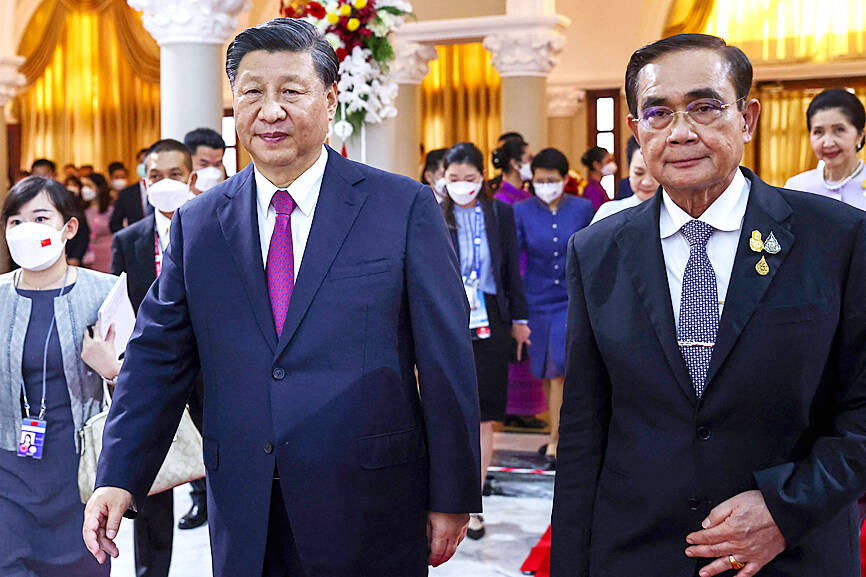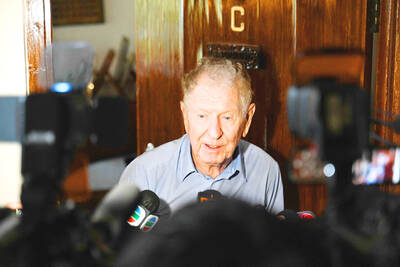Leaders from across the Asia-Pacific region called for an end to Russia’s war on Ukraine and pledged to steer the region’s economies toward sustainable growth as they wrapped up summit meetings yesterday.
Host Thailand garnered a diplomatic coup in managing to bridge divisions among the 21 members of the APEC forum by saying that most members had condemned the war. Russia is an APEC member, as is China, which has generally has refrained from criticizing the invasion of Ukraine.
The declaration issued by APEC leaders acknowledged differing views on the war and said the forum, which is devoted largely to trade and economic ties, was not a venue for resolving such conflicts.

Photo: AFP
However, it noted that the war and other security issues “can have significant consequences for the global economy.”
The leaders’ statement said that the war is causing immense human suffering as well as worsening inflation, supply chain troubles, food insecurity and financial risks.
APEC wrapped up a flurry of meetings in Southeast Asian countries this week, events that gave leaders opportunities for in-person talks that have been rare in the past two years.
US Vice President Kamala Harris met briefly with Chinese President Xi Jinping (習近平) yesterday before the final APEC meeting began.
She reinforced US President Joe Biden’s message that “we must maintain open lines of communication to responsibly manage the competition between our countries,” a US official said on condition of anonymity.
The brief discussion came after the US said it was looking for China to do more to rein in North Korea, which on Friday test-fired a ballistic missile that US and Japanese officials said was capable of hitting the US mainland.
Xi said he viewed a meeting with Biden earlier in the week as a step toward a “next stage” in ties between the two largest economies, a Chinese government summary of the meeting said.
US-China relations have deteriorated in the past few years, but Harris told Xi that the US “does not seek confrontation or conflict with China.”
Harris received a “handover” in the form of a symbolic “chalom” bamboo basket from Thai Prime Minister Prayuth Chan-ocha, the APEC host. The US is to host next year’s summit in San Francisco.
Prayuth opened yesterday’s meeting by urging the leaders to push ahead with APEC’s agenda of promoting free trade in the Indo-Pacific region.
“We have to give priority to turning this plan into action,” he said.
Security risks are not on the formal APEC agenda, but Prayuth said North Korea’s numerous recent missile launches were discussed, and “everybody shares concern on that issue.”
Both at APEC in Thailand and at the G20 meeting in Indonesia, officials appear to have chosen to agree to disagree about the Ukraine war, while voicing anguish over its deepening impact. In Bangkok and Bali, countries that have refused to condemn the invasion refrained from blocking the release of statements harshly criticizing Moscow.
The leaders’ declaration, released yesterday, also called for promoting more use of clean energy and more secure, environmentally sustainable food systems, among an array of goals that also address illegal, unregulated and unauthorized fishing, illegal logging, marine waste, improvements to public health and better access to vaccines.
The summit venue, at Bangkok’s main convention center near a vast parkland, was cordoned off with some streets closed to traffic. Riot police stood guard behind barricades at major intersections to keep protesters far away.
Police in another area of Bangkok on Friday clashed with demonstrators who took the opportunity of the APEC meeting to renew calls for democratic reforms in Thailand and accuse the government of promoting policies to APEC that favor big business over ordinary people.
There were violent confrontations with some protesters who tossed debris and other items at police, who then charged the crowd, shooting rubber bullets. Several people were injured and a number of arrests were made in the standoff, which lasted several hours.
Additional reporting by AFP

US PUBLICATION: The results indicated a change in attitude after a 2023 survey showed 55 percent supported full-scale war to achieve unification, the report said More than half of Chinese were against the use of force to unify with Taiwan under any circumstances, a survey conducted by the Atlanta, Georgia-based Carter Center and Emory University found. The survey results, which were released on Wednesday in a report titled “Sovereignty, Security, & US-China Relations: Chinese Public Opinion,” showed that 55.1 percent of respondents agreed or somewhat agreed that “the Taiwan problem should not be resolved using force under any circumstances,” while 24.5 percent “strongly” or “somewhat” disagreed with the statement. The results indicated a change in attitude after a survey published in “Assessing Public Support for (Non)Peaceful Unification

The CIA has a message for Chinese government officials worried about their place in Chinese President Xi Jinping’s (習近平) government: Come work with us. The agency released two Mandarin-language videos on social media on Thursday inviting disgruntled officials to contact the CIA. The recruitment videos posted on YouTube and X racked up more than 5 million views combined in their first day. The outreach comes as CIA Director John Ratcliffe has vowed to boost the agency’s use of intelligence from human sources and its focus on China, which has recently targeted US officials with its own espionage operations. The videos are “aimed at

‘MISGUIDED EDICT’: Two US representatives warned that Somalia’s passport move could result in severe retaliatory consequences and urged it to reverse its decision Minister of Foreign Affairs Lin Chia-lung (林佳龍) has ordered that a special project be launched to counter China’s “legal warfare” distorting UN Resolution 2758, a foreign affairs official said yesterday. Somalia’s Civil Aviation Authority on Wednesday cited UN Resolution 2758 and Mogadishu’s compliance with the “one China” principle as it banned people from entering or transiting in the African nation using Taiwanese passports or other Taiwanese travel documents. The International Air Transport Association’s system shows that Taiwanese passport holders cannot enter Somalia or transit there. The Ministry of Foreign Affairs (MOFA) protested the move and warned Taiwanese against traveling to Somalia or Somaliland

Four former Hong Kong opposition lawmakers jailed in the territory’s largest national security case were released yesterday after more than four years in prison, the first among dozens convicted last year to regain their freedom. Former legislators Claudia Mo (毛孟靜), Jeremy Tam (譚文豪), Kwok Ka-ki (郭家麒) and Gary Fan (范國威) were part of a group of 47 public figures — including some of Hong Kong’s best-known democracy advocates — who were charged with subversion in 2021 for holding an informal primary election. The case fell under a National Security Law imposed on the territory by Beijng, and drew international condemnation and warnings